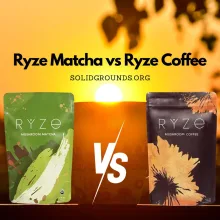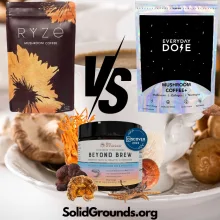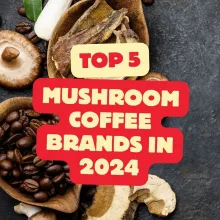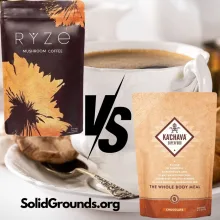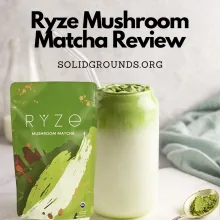Does Mushroom Coffee Have Caffeine? | Solid Grounds
Mushroom coffee is a unique beverage that blends traditional coffee beans with extracts and powders from functional mushroom species like reishi, cordyceps, and lion’s mane. Compared to regular coffee, mushroom coffee generally contains 25-50% less caffeine, typically in the range of 50-80mg per serving, though levels vary by brand.
Despite the lower caffeine content, many report a more balanced, sustained energy experience without the mid-morning crashes and jitters of regular coffee, likely due to the adaptogenic effects of the mushrooms moderating caffeine’s stimulant impact. Brands offer low, moderate, high, and decaf options to cater to different caffeine preferences. When consumed in moderation, mushroom coffee provides a thoughtful approach for satisfying caffeine cravings with a unique flavor and physiological effects.
Our #1 Recommended Mushroom Coffee | Our #2 Recommended Mushroom Coffee |
 |  |

Exploring the Caffeine Content and Effects of Mushroom Coffee
In the ever-expanding world of coffee alternatives, mushroom coffee has emerged as one of the most innovative and intriguing brews. By blending traditional coffee beans with extracts and powders from a variety of functional mushroom species, mushroom coffee aims to provide a unique drinking experience – both in flavor and the physiological effects it delivers.
One of the key distinguishing factors of mushroom coffee compared to regular brewed coffee is its caffeine content and the nature of the energy boost it provides. As consumers increasingly seek balanced, healthy sources of energy, understanding the caffeine profile of mushroom coffee becomes an important consideration.
So how does the caffeine in mushroom coffee stack up? And what kind of “buzz” can drinkers expect?
Measuring Caffeine in Coffee
Before diving into the specifics around mushroom coffee, it’s helpful to understand how caffeine is quantified in coffee beverages. Caffeine levels are typically measured in milligrams per serving, with one 8-ounce cup used as a standard.
The average cup of regular drip coffee contains around 95mg of caffeine. This number can vary based on factors like the coffee bean origin, roast level, and brew ratio. Espresso shots pack an even more concentrated punch, averaging 63mg per 1-ounce shot.
Caffeine Levels in Mushroom Coffee
When it comes to caffeine, popular mushroom coffee brands generally contain lower levels compared to a standard cup of joe. Here are some examples:
- Four Sigmatic Mushroom Coffee with Lion’s Mane: 50mg per serving
- Mud\Wtr Mud Coffee: 60-80mg per serving
- Om Organic Mushroom Latte Mix: 70mg per serving
These numbers represent approximately a 25-50% reduction in caffeine versus a typical cup of drip coffee.
However, it’s important to note that caffeine amounts can vary significantly between different mushroom coffee products. Some may contain caffeine levels closer to regular coffee, while others emphasize very low or decaf options.
Caffeine Experience
Despite having less caffeine overall, many mushroom coffee drinkers report that the effects feel more balanced and sustained compared to the ebbs and flows of a regular coffee buzz. There’s often a subtler buildup of energy without the mid-morning crash and anxiety that can sometimes accompany high doses of caffeine.
This phenomenon likely results from the synergistic combination of coffee and adaptogenic mushroom extracts working together.
Adaptogens like reishi, cordyceps and lion’s mane are thought to help the body adapt to stress and modulate the effects of stimulants like caffeine. So rather than an abrupt spike followed by a drop, the caffeine effects are smoothed out into a steadier, more focused boost.
Mushrooms themselves also naturally contain small amounts of compounds like adenosine and cordycepic acid that may contribute to more sustained energy. And ingredients like cacao and MCT oils sometimes added to mushroom coffee blends can further enhance this effect.
Understanding Caffeine Sources
It’s also important to clarify the source of caffeine in mushroom coffee. Despite the mushroom components, the primary caffeine content still comes from the coffee beans themselves, not the mushrooms.
While medicinal mushrooms like cordyceps have been used traditionally for energy enhancement, they contain negligible amounts of caffeine – perhaps 1-2mg per serving in mushroom coffee. The caffeine levels are derived almost entirely from the amount of coffee in the formulation.
Low, High and Decaf Options
To accommodate different caffeine preferences, mushroom coffee brands offer several options:
Low Caffeine – Some brands specifically market low caffeine mushroom coffees, containing as little as 10-20mg per serving. These appeal to those highly sensitive to caffeine or looking to greatly minimize intake.
Moderate Caffeine – As shown in the earlier examples, many mushroom coffees naturally fall into a moderate range of 50-80mg per serving. This hits a sweet spot of providing an energy boost while limiting overstimulation.
High Caffeine – On the opposite end, there are some mushroom coffee products matching or exceeding regular coffee levels – around 100-120mg per serving. These cater to those who crave a bolder caffeine kick.
Decaf – For the true caffeine avoiders, decaf mushroom coffee options also exist. Though small amounts of caffeine may still remain, they allow consumers to enjoy the mushroom experience without the stimulant.
Safety and Moderation
Health experts generally recommend limiting daily caffeine intake to under 400mg for most adults. Mushroom coffee consumed in moderation can fit safely within these guidelines.
As always, pay attention to how your body responds and adjust consumption levels accordingly. Those with sensitivities should start low, and certain populations like pregnant women may want to avoid caffeine sources altogether.
The Bottom Line
In summary, mushroom coffee represents a moderated caffeine profile compared to regular brewed coffee. The typical blend contains around 25-50% less caffeine, with the adaptogenic mushrooms helping to smooth out the stimulant effects into a steadier, more balanced energetic experience.
Brands offer varying caffeine levels to cater to individual tastes and needs. From low to moderate to high options, and even decaf varieties, there’s a mushroom coffee energy level to match different lifestyles.
When consumed in moderation as part of a balanced diet and lifestyle, mushroom coffee provides a thoughtful, health-conscious approach for satisfying caffeine cravings.
Our #1 Recommended Mushroom Coffee | Our #2 Recommended Mushroom Coffee |
 |  |
FAQs and Answers
Does the caffeine in mushroom coffee come from the coffee or the mushrooms?
The caffeine in mushroom coffee comes primarily from the coffee beans, not the mushrooms.
The article clearly states:
“Despite the mushroom components, the primary caffeine content still comes from the coffee beans themselves, not the mushrooms.”
It further explains that while some medicinal mushrooms like cordyceps have traditionally been used for energy enhancement, they contain negligible amounts of caffeine:
“While medicinal mushrooms like cordyceps have been used traditionally for energy enhancement, they contain negligible amounts of caffeine – perhaps 1-2mg per serving in mushroom coffee.”
So the caffeine levels in mushroom coffee products are derived almost entirely from the amount and type of coffee beans used in the formulation, not from any significant caffeine provided by the functional mushroom extracts and powders.
The mushroom components play more of a role in modulating and balancing out the effects of the coffee’s caffeine, rather than directly contributing substantial caffeine themselves.
How does the caffeine content of mushroom coffee compare to energy drinks or other caffeinated beverages?
We can make some general comparisons:
Popular mushroom coffee brands typically contain 50-80mg of caffeine per 8oz serving. Some may go as low as 10-20mg or as high as 100-120mg.
In comparison:
- A standard 8oz energy drink usually contains 70-100mg of caffeine.
- An 8oz cup of black tea has around 47mg of caffeine.
- An 8oz can of cola has around 35mg of caffeine.
So on average, mushroom coffee falls into a similar range as many popular energy drinks in terms of caffeine per serving. It likely contains more caffeine than black tea or cola.
The key difference is that the caffeine in mushroom coffee is derived solely from coffee beans, whereas energy drinks often use synthetic caffeine from sources like guarana. Mushroom coffee also contains the balancing effects of the mushroom extracts.
So while caffeine amounts may be comparable in some cases, the source, formulation, and combined physiological impact makes the caffeine experience quite distinct between mushroom coffee and beverages like energy drinks.
Can you get addicted to the caffeine in mushroom coffee like regular coffee?
Yes, it is possible to become addicted to the caffeine in mushroom coffee, similar to regular coffee.
It’s important to understand that the primary source of caffeine in mushroom coffee is still from the coffee beans themselves.
Caffeine is a stimulant and can be physically and psychologically addictive regardless of the source. Regular consumption of caffeine from coffee, both regular and mushroom varieties, can lead to dependence and symptoms of withdrawal when intake is reduced.
The potential adaptogenic effects of the mushroom extracts used in the blends may help moderate the stimulant impact and provide more balanced energy. However, this doesn’t eliminate the addictive potential of the caffeine itself.
So while the overall caffeine levels in mushroom coffee may be lower than regular coffee on average, the caffeine present is still derived from coffee beans. If consumed frequently and in substantial amounts, mushroom coffee can lead to caffeine addiction in the same manner as regular coffee.
Moderation, monitoring your body’s response, and being mindful of caffeine intake from all sources is advisable to avoid potential dependence, whether drinking mushroom coffee or any other caffeinated beverage.
Are there any mushroom coffee brands that add extra caffeine beyond what’s naturally in the coffee beans?
Yes, some mushroom coffee brands do add additional caffeine beyond what’s naturally occurring in the coffee beans. A few examples include:
- Four Sigmatic Mushroom Coffee: This contains coffee beans plus sources of natural caffeine like guarana and yerba mate to provide an extra caffeine boost.
- Mushroom Revival Lion’s Mane Coffee: This has coffee beans plus added natural caffeine from guarana seed extract. They advertise it as having “2x caffeine”.
- Zhou Nutrition Mushroom Coffee: This contains coffee beans and additional “energizing herbs” including guarana and yerba mate. The extra herbs provide additional caffeine.
- Blissfix Mushroom Coffee Mix: This mix contains coffee along with guarana and yerba mate for supplemental caffeine content beyond the coffee itself.
So in short, if you see mushroom coffee products advertised as having “extra caffeine” or additional energizing herbs/extracts like guarana or yerba mate added, then there is likely to be more caffeine content than just pure coffee beans alone. The added caffeine claim is meant to give more of an energy kick.
Does brewing method (immersion, drip, etc.) impact the caffeine levels extracted from the coffee beans in mushroom coffee?
Yes, the brewing method can impact the caffeine levels extracted from coffee beans in mushroom coffee, just as it does with regular coffee. Here’s a quick overview:
- Immersion methods (French press, cold brew) tend to extract less caffeine than drip methods. The longer coffee grounds are immersed, more caffeine will be extracted up until a point.
- Drip coffee methods (automatic drip machines, pour-over) tend to extract more caffeine as the hot water is repeatedly washed over the grounds. Water temperature also plays a role.
- Espresso extractions lead to lower caffeine content by volume because less water permeates through the finely ground beans in short bursts, though concentration by weight is higher.
So with mushroom coffee blends, a French press immersion may extract less caffeine from the beans than automated drip or pour-over would. Following package instructions can maximize extraction. Coarseness of the grind also impacts extraction and caffeine content.
Additionally, the added sources of caffeine in mushroom coffees, like guarana or yerba mate, are likely to extract differently than the coffee beans themselves. So total caffeine may vary by brew method but is still likely higher than pure coffee alone.

